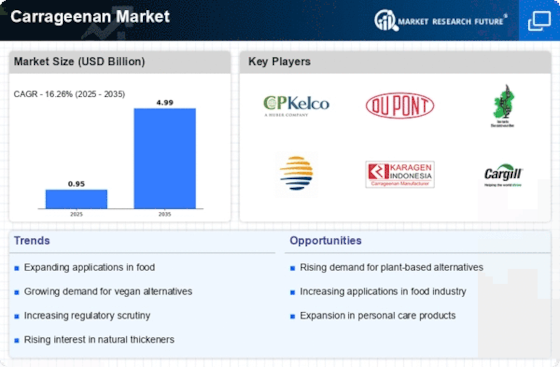Top Industry Leaders in the Carrageenan Market

Strategies Adopted by Carrageenan Key Players
The competitive landscape of the carrageenan market is a dynamic ecosystem influenced by various factors, including key players, market strategies, emerging companies, industry news, and investment trends. Carrageenan, a widely-used ingredient in food, pharmaceuticals, and personal care products, has spurred a competitive environment driven by innovation, quality, and sustainability.
Strategies adopted by these key players revolve around addressing market demands for natural, organic, and sustainably sourced carrageenan. The emphasis is on product differentiation through technological advancements in extraction methods, ensuring higher quality, and catering to niche market segments. Additionally, market incumbents are increasingly focusing on geographical expansion and diversification of product applications to stay ahead in this competitive landscape.
Market share:
Market share analysis in the carrageenan industry hinges on several factors, notably product quality, pricing strategies, distribution networks, regulatory compliance, and customer loyalty. Quality control and compliance with food safety regulations play a crucial role in determining market share, especially as consumers become more conscious about the origin and safety of food ingredients. Additionally, companies offering competitive pricing while maintaining quality standards tend to capture larger market shares.
Amidst established players, new and emerging companies are making strides in the carrageenan market by introducing innovative products and sustainable sourcing practices. Companies like Shemberg Marketing Corporation and Gelymar S.A. are gaining traction through their focus on sustainable and organic carrageenan, catering to the rising demand for clean-label products. These newcomers often disrupt the market by offering specialized products or entering niche segments overlooked by larger players.
Industry News:
The industry constantly witnesses developments and news, ranging from technological advancements in extraction techniques to shifts in consumer preferences and regulatory updates. For example, advancements in biotechnology have led to the development of new strains of seaweed with higher carrageenan content, impacting production efficiency and sustainability. Moreover, consumer preferences for plant-based and natural ingredients have propelled research and development efforts toward enhancing carrageenan's functionalities and applications.
Current company investment trends in the carrageenan market predominantly focus on sustainability, technology integration, and market expansion. Companies are increasingly investing in sustainable sourcing practices, aiming to secure a consistent and eco-friendly supply chain. Furthermore, investments in research and development to improve extraction methods and product applications remain a key area for many players. Additionally, strategic investments in emerging markets and partnerships with local suppliers or distributors are witnessed to capture new opportunities.
Overall, the competitive scenario in the carrageenan market is characterized by a blend of established industry leaders and agile, innovative newcomers. Strategies revolve around innovation, sustainability, and expansion, with a keen focus on meeting evolving consumer preferences for natural, safe, and versatile ingredients. As the market continues to grow and evolve, companies will likely intensify their efforts to differentiate themselves and gain a competitive edge in this dynamic landscape.
Recent News:
Carrageenan has received approval from the FDA in the United States for use as a food additive. While some individuals claim that removing carrageenan from their diet has alleviated symptoms like bloating and IBD-related stomach discomfort, there is currently no scientific research backing these assertions.
Key Companies in the Carrageenan market include
- Ingredion Incorporated
- TBK Manufacturing Corporation
- PT Fortuna Cahaya Cemerlang
- Cargill Incorporated, LTD
- Danlink Ingredients
- Caldic B.V.
- ACCEL Carrageenan Corporation
- MCPI Corporation
- Scalzo Food Industries
- Marcel Trading Corporation
- Soriano SA
- Gelymar SA
- Birmingham Biotech Ltd
- Kerry Group.











